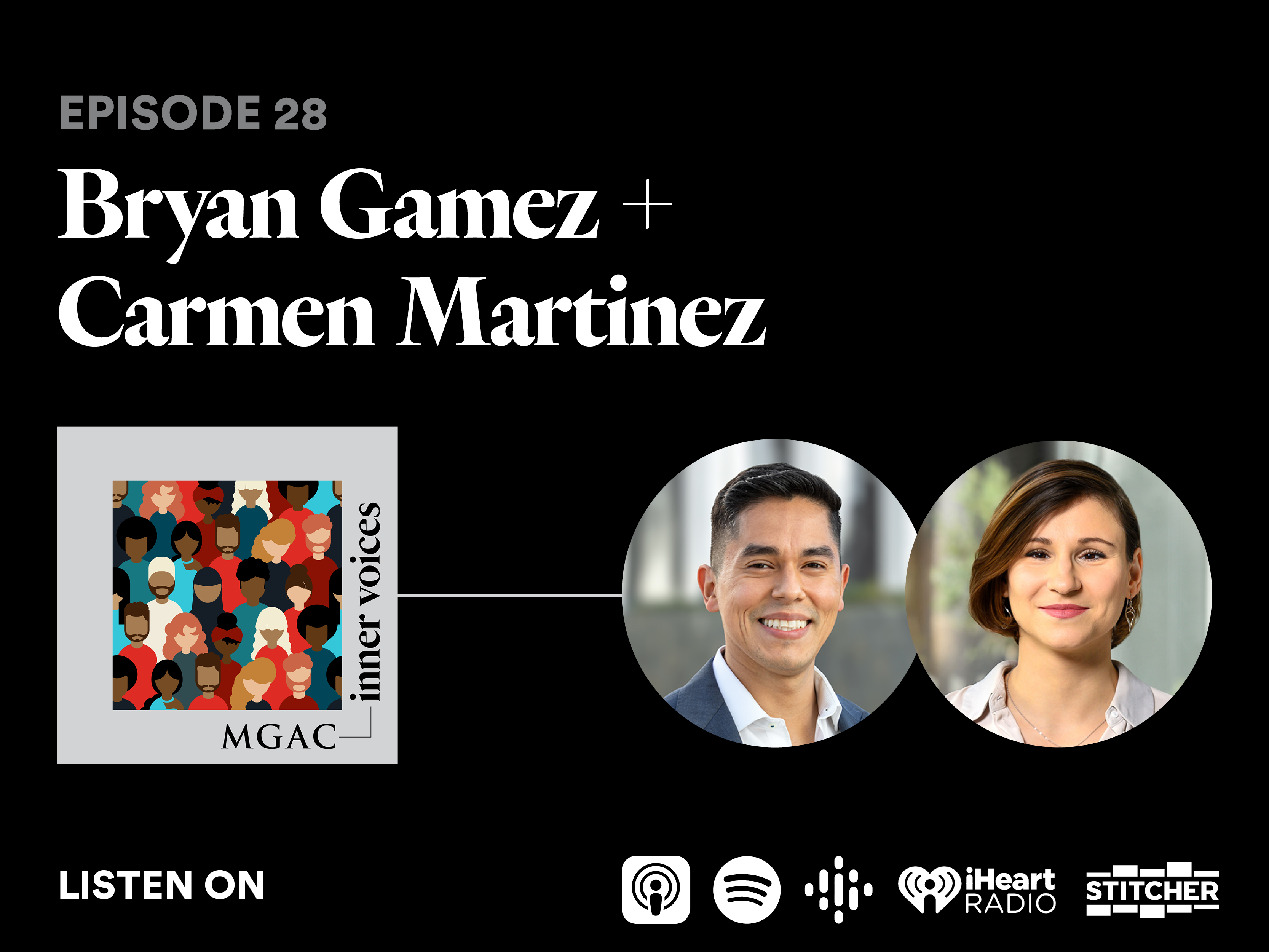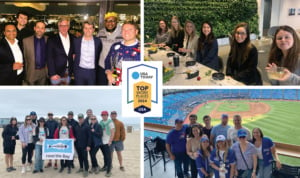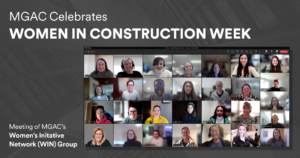MGAC Inner Voices: Episode 28

MGAC Inner Voices is an interview format podcast where a diverse mix of employees are interviewed to share their perspective on challenges they have faced in the A/E/C industry as a result of their identity—including race, ethnicity, religion, age, gender, sexuality, ability, etc. By discussing the experiences of our staff, our hope is that their stories will have newfound and powerful resonance with the audience—both to comfort others in similar situations and to encourage those in positions of power to bring about positive, actionable changes to workplace environments for all A/E/C professionals, regardless of their identity.
Bryan Gamez (MGAC Project Manager, Los Angeles) speaks with Carmen Martinez (MGAC Project Manager, London) about cultural differences between Spain and the United Kingdom, her involvement in programs to advance mental health awareness, and cultivating a workplace culture of openness.
ADHD support groups in the United Kingdom and U.S.
United Kingdom
AADD – Adult ADD
ADDISS
Liverpool Ladders for Life
Manchester Support Group
Oxfordshire Adult Support Group
Scotland Adult ADD support group
United States of America
CHADD – Children & Adults with ADD
ADDA
National Institute of Mental Health
The Edge Foundation
View Transcript
Transcript
Bryan: Hey, everyone, and welcome back to "MGAC Inner Voices," a podcast taking you into the issues of diversity, equity, and inclusion in the architecture, engineering, and construction industry. I just, as always, want to preface this podcast by letting you know that I'm not an expert in all things diversity, equity, and inclusion. We're just here to share our stories and discuss our experiences and how together we can create better outcomes for all of us in the MGAC industry. I'm Bryan Gamez, a project manager at MGAC, working and living in Los Angeles, California. And this morning, or I guess this afternoon, we have Carmen Martinez. By the way, everyone, I'm just really excited about this because I'm a Latino in the United States and Carmen is a Spaniard in the UK. So it's just interesting to have this perspective. ¿Cómo estás?
Carmen: Hola. ¿Qué tal? It's very nice to be here. Thank you, Bryan. And actually, I think this is a lovely initiative. I'm really happy. Feel humbled that you have me.
Bryan: Well, I'm happy that you're here. Gracias. Carmen, tell me a little about yourself.
Carmen: So I'm a project manager. I am initially trained as a construction engineer. So I come from Spain. I have been in the industry almost up to seven years. So I've been working in structural engineering as an intern. Then I came because an opportunity came up and I started working with a subcontractor. Then I moved back to Spain, tried some luck there. But, you know, industry and construction over there is not doing great right now. And I came back in 2020 just before COVID hit. And I've been working with a main contractor for quite a while. And it was only in September that I joined the consultancy side of things with MGAC.
Bryan: Well, we're happy to have you. Welcome.
Carmen: Thank you.
Bryan: Honestly, I really do love that you're here. And I just want everyone to know that we're going to be talking about Carmen's experience as a female immigrant in the United Kingdom. I'm going to just jump into it. How does it feel being a Spaniard in the UK in the construction industry? Have you ever faced any microaggressions? I mean, even I'm just going to ask, racism. This is something that I am so unaware of, given that I don't really know the culture in the UK, but tell me more.
Carmen: When I first came, I think you come also with the white privilege. And ever since I was little, my family was very vested that we are aware of our privilege. So I came to the UK with my ID. I didn't need to get a visa. The UK was still in the European Union. So it was quite easy. And it wasn't until a colleague in the office kind of mentioned, whilst there were images in the news of Syrian refugees coming into the UK through the tunnel, in the Euro tunnel, he made a comment, I think, he made it as a joke, but it wasn't very mindful. He just said, "Oh, those are the Syrians you came in through with."
And that kind of struck me on, "Wow, okay, yeah, you still get racism even if you're white." But you'll just realize I had a conversation with him that it's not the same. These people are refugees. I was lucky enough to be able to enter the country just with my ID. That's it. That's all I needed to land a job. And I think having honest conversations with people without sending them guilt-tripping helped out a lot because then he did change that mindset, and he never ever made a comment as such.
Bryan: I'm happy that you were able to say something to him and change his perspective.
Carmen: I think a lot of people put it through as banter, and here they use that word a lot. So it's just banter, but it depends on the human you are, that you actually push past that "it's just banter." And I think that's where the difference sits as well.
Bryan: Have you ever faced microaggressions at work? I think we've talked about how there have been previous incidents involving managers' inappropriate comments.
Carmen: Well, I work in a very male-dominated industry, so I kind of was expecting some of it, but talking about cultural differences when I came from Spain, my perception was that Spain was behind in the construction industry in terms of sexism at the workplace. And then when I came here, I realized, "Whoa, there's a whole next level of how inappropriate some people can get." So yes, I have faced sexual harassment.
And when kind of initially you brush it off, so you don't want to be the difficult woman, so you kind of try to bump in, be one of the lads, but that doesn't help. If anything, it just snowballs. And when I've complained, I've suffered as a consequence bullying both by my colleagues and my managers. I definitely had allies, and they made all the difference. That's why I was able to survive the day. And that's why I'm so keen that we are very aware that male allyship is so very necessary.
Bryan: Can you describe an incident?
Carmen: I befriended a colleague at work and kind of people started getting the wrong idea. And it started with more inoffensive comments like, "You guys argue like a married couple," which is not okay, but it's mild. Until it got to the point of the suggestion of my team lead, "We should just get it on and over with," like, alluding...
Bryan: Like a sexual reference.
Carmen: Yes. Or just like calling me out from across the room like, "Leave the man alone. He's a married man." Like, "Oh, excuse me." I think it's difficult when you're then there, I just started guilt-tripping myself. Like, "I feel this. It was my fault. I befriended a man, and I've been told that, see." That was, like, the wisdom my mom gave me. And I don't befriend male colleagues at work because they get the wrong impression. And then you are the one that gets in trouble. But I think we spend with our colleagues, like 80% of our weekday. So it is really hard to not befriend the people that you're working with. And especially, if you're so many hours in construction, you work long hours together under really stressful situations.
Bryan: How did your male colleague who you befriended, how did he feel about this? Because it sounds like...was it him that was also included in the banter?
Carmen: Yeah, there was a reaction that I did not expect. He took offense that I complained. He thought I was making a whole lot of fuss about nothing or maybe not about nothing, but, like, I think he just was trying to avoid stirring any trouble. And also, you know, if you're part of the gang, you don't complain, do you? Obviously, our friendship ended, and it was uncomfortable because the one person I expected to support me as an ally was actually gaslighting me, "Basically, you're complaining about something that is not real. You're making it up."
Bryan: What he should have done is he should have listened to you, heard what your concerns were. And these are very valid concerns, Carmen. And he should have said something to his team manager, and say, "Hey, man, you're out of line. I think you're making Carmen feel...not I think, you're making Carmen feel uncomfortable, and you're also making me feel uncomfortable." They have to realize that they are creating an uncomfortable situation.
Carmen: Got defensive, and there was no need for that because it wasn't an attack on them personally. I understand that it's an industry. It's how we've grown. It's the examples we've seen. And we can acknowledge that being comfortable with it because it's okay to be uncomfortable. Obviously, no one wants to be the bad one in the picture, but it's like sitting there and saying, "Okay, how can I do better?"
And they had examples in the office. There were colleagues that did call it out because it was not just that, it's they talked about their personal lives and their intimate relationships. They shared a lot of inappropriate content through WhatsApp groups. Well, that shouldn't happen in the office. And one of the colleagues did call it out on a number of occasions. Like, "This is so not okay. This is really horrible. And I don't know what Carmen must think of us, but, yeah, that we're just brutes." And he was, "Okay. Thank you."
Bryan: And were you the only immigrant in the office or were you the only female in the office at that point?
Carmen: I was the only female in the office at that point. Yes.
Bryan: So they didn't even know what they were doing was not okay. Because they had been so used to this workplace culture.
Carmen: Yeah. And I think that is the problem. That's where we need diversity. Because when you get that diversity, that's when you start working through those issues and shining a light on actually, as much as you guys do that, it's not okay.
Bryan: And I think inclusion and diversity is even more important these days. And the idea is not separating us into different types of groups. It's just being more aware of the different perspectives and how to create a more thriving environment, right? That's what I get stuck on how people think that something is going to be taken away from a privileged group of people.
No, it's trying to create a much better environment for everyone. And just by sharing our experiences, right? There isn't one group of people in this world. There's so many different types of people. And I think we all drive the economy, right? So when you complained, what happened? Can you talk me through that? Or how did you handle that situation?
Carmen: So initially, I tried not to complain high up. I had a conversation with a fellow female, also in the industry, and she thought it was best that they didn't feel threatened. So I didn't go to HR. I just spoke to my line manager. That didn't work out because I got bullied instead. They got the very wrong impression. Then I, again, didn't talk to HR. I just went to the people above and spoke to my directors, and they proved they need training.
I think sometimes awareness is a skill and you need to train it. You need to be able to respond to these circumstances. Just as you would have first aid training or mental health first aid training. These things might happen. If you're in a leadership position, you need to be able to hear this out and actively manage it. And I think they just pushed it aside because I was moving to another site and that never got escalated.
Bryan: Do you know if they ever spoke to your colleague?
Carmen: Well, they did, and it only made my situation worse because, obviously, I had gone over his head and complained. So that absolutely did not improve my situation whatsoever. And then when HR, finally, brought myself to complain about it, not because I wanted anyone fired or a formal investigation carried out, just one of the people involved in all of this had been included in a group where we were exposed to vulnerable people, and he shouldn't be in part of that group.
And it was really scary because I also was scared of the consequences of complaining about that, but I knew it was the right thing because should anyone in a vulnerable situation come up against the same I had lived through, I know I would have felt the guilt of not doing more about it, so I spoke up. I spoke with HR, absolutely nothing happened. They did listen to me, and they seemed very vested in taking action, but I realized that's my time.
Bryan: It fell flat. So you've talked about the toxic workplace culture that you faced at your previous job. I want to segue into, you talked about that you joined a women internal group and also you have mental well-being training. So did that all lead you to joining these initiatives?
Carmen: So the mental health first aiding, I took the training in my previous workplace.
Bryan: And sorry, Carmen, can you tell our listeners what mental health first aiding is?
Carmen: Yeah, sure. So mental health first aid training is an awareness training so that you can respond when someone approaches you with any symptoms. I mean, it's not a very in-depth course, it's just to kind of spot those symptoms and provide support and help and drive people into the right solution that could best support them. So it's either they approach us or we see certain signs and we approach them. So it's a training to have that awareness and a set of skills to be able to help more effectively.
Bryan: I love that. How do you get to that? Is this, like, a program in the UK or an initiative that...?
Carmen: It's actually an Australian initiative, and I think the company is worldwide. I can send you details, maybe you wanna...
Bryan: I love that. Yeah, we could always...
Carmen: I gave it to the [inaudible 00:14:14].
Bryan: Oh, thank you, Australia. Talk a little bit more about the mental health first aid and then also the women's internal group that you've had.
Carmen: So both of them are right now starting. So we're a bit green. We're working through what we want to achieve and how we can achieve it. One of the things that is brilliant about the networking with other women is you get perspectives, whether it's with the mental health groups and networking events or the women's networks. There are many women's networks. Both these initiatives are great, but on their own, they can't do much to support our colleagues, our partners. You need a structure, you need a strategy and you need targets. So what we're working through now is through those targets. So they're realistic.
It's like, right now, you can't just say, "My target is for sales in the annual review." You wouldn't say, "Oh, next year, we plan on making some money." You have realistic targets, and I think the same happens with mental health. You need to have those goals with the women's initiative is setting those goals. So I think, right now, the key is setting up a structure. So, one, with the mental health group, we have a support that is integral within MGAC that is creating awareness, but also providing the resources that the employees and even the partners need because it is something that drives outside the industry. In the UK is something that now is going hot. Even when you encounter a new partner you might engage with, sometimes they approach what are your mental health policies. It's already a thing.
Bryan: Oh, it's being talked about now more actively in the UK.
Carmen: Yeah, very much so.
Bryan: It seems like it's a brand new thing.
Carmen: It is, and it isn't. It's been there latent for a number of years. That's why I refer to just existing doesn't make you valuable or useful. You need to have those targets and the target, for example, one is getting awareness and providing real resources. And with the women internal network, I think, that is the goal too. I only joined recently in September, and I was able to attend the first UK in-person meeting between all of them.
But it's, one, to give that platform for the women in the company to feel safe, it's also to get support and mentoring opportunities because a lot of times...
Bryan: I love that.
Carmen: ...other women have endured it before you, so why are you going to have to do all the hard work again? Get that expertise, get that knowledge, and empower women just within our company and in the industry overall.
Bryan: Is it within, and is this an initiative that also includes other companies as well?
Carmen: So for the mental health, there is a goal to do so with the women internal network, not yet, but we do participate in women networking events. And one of the goals sort of we're working on is HeForShe. That is a UN program. I don't know if you've heard of it, is to create allyship because it's all well and good that we do for each other as women, but it's so very important to create that awareness among the men. That we don't think we're just like the circle of witches gathering together among all witches.
Bryan: That's so funny. And you know you're not. But no discrimination against any of those witches out there though. So how has it been since you've joined MGAC? Do you see a difference in the cultural workplace? I know that not every workplace is perfect, and I know that we're trying hard here, globally, and it's different obviously in America than the United Kingdom, but how do you feel? Do you feel more safe? Do you feel more valued?
Carmen: It's great. To be fair, when I started, I was a bit scared because, obviously, I come from the contractor side, it's way more wild, and this is more corporate. So I did have a bit of the imposter syndrome until I really fit in here.
Bryan: I still have imposter syndrome.
Carmen: All the time, every day, never mind.
Bryan: I get it.
Carmen: But that's the thing, people here are so supportive that they're like, "Oh, don't worry, you'll wing it. You're going to do great." And it's very supportive. It's so very inclusive. It's great that people feel safe to be their full selves. I had the experience of having colleagues in previous roles where they didn't really feel safe to bring their full selves to work. So if they were gay, they wouldn't say. If they were neurodiverse, they wouldn't speak out loud.
Well, it actually took me three years into being at my previous role to actually come clean, let's say, between commas. I was like, "Actually, I'm ADHD." Everyone thought, "Oh, she's so organized. How can it be?" It's like, "No, there is..." Like, you hide it. You learn really well how to camouflage. Here I can feel that there is an awareness and a support behind it. So if I'm feeling nervous or if I don't understand something, they don't make it awkward. It's just being natural about it. So sometimes you'll highlight something that to you is very much obvious, but it's not to someone else. And that's not trying to guilt trip anyone. It's not obvious for you, I can see that, but this is how it makes me feel.
Bryan: Yeah. And I think that's what we're trying to do here at MGAC. We're just trying to have a conversation. I get that not everything is going to be an easy conversation, but we want to provide everyone with the resources that you feel safe in this workplace and that you can talk freely about yourself and that you feel supported at the end of the day. So I'm so happy that you feel that way.
When you told me about your friend and not feeling safe in her own workplace, like you said earlier, we spend a majority of our time working with others. So it's unfortunate that they can't see their full potential at work because it really does affect how you work. Your efficiencies. And so I'm really happy that you're having that sense of security here. Earlier in the conversation, you talked about the cultural differences between the UK and Spain. Can you talk a little bit more about that and what those differences are?
Carmen: Yeah. When I came, I realized there were way less females than I expected in construction, especially on-site. I think I was very naive. It's something, part of your day-to-day. I went to university where we were almost 50-50. There was a year even that there were way more women than there were men in our degree. And our degree is mostly aimed to people who want to be working on-site. Some people end up in offices as project managers and such, but a lot end up as construction managers or project managers on site.
So for me coming here and seeing that there weren't that many women on-site, I thought, "Wow, there's a gap there." And then when someone said, "Oh, but what are you going to do when you're a mom?" So what do you mean, I'm working?
Bryan: Excuse me? No.
Carmen: Like, "When you become a mother, are you..."
Bryan: Sorry. I don't get that. I don't get when men say that. Like, you don't say, "Oh, what are you going to do when you're a dad?" It's so ignorant. And I'm sorry I'm getting really passionate here, but I need dads to know this and men to know this. As a gay man too. Like, there's not going to be a mom in my...there's not going to be...I don't have a wife. I'm going to have a husband. It's just such an unfair question. Like, yes, you can raise a child. It's like, are they not raising their child? Are they an absent father? I'm sorry. I just hate that question.
Carmen: Well, I did respond that who tells you that I want to be a mom because I'm very snappy.
Bryan: You go, girl.
Carmen: I like making people uncomfortable with their uncomfortable questions. I was like, "Who said I want to be a mom?" They're like, "Okay, if you ever would..." And just gave another go. I thought, okay, yeah, if you think about it, the maternity policy is really short period of time of paid leave. And then besides that care for children is so expensive. Whereas in Spain, maternity leave is longer and well-paid. Then you've got the perk that workplaces normally adapt and help out, and it doesn't really undermine your progression opportunities. If you're a good professional and you work six hours a day because you need to do a school pickup, you're just a good professional as if you worked eight hours.
And then there is the thing, childcare is way, way, way cheaper because it's integral to part of society. You need to be able to afford childcare. My mom raised me as a working mom. My mom was raised by a working mom. My grandma was a working grandma. So it came as a shock in that sense of, okay, there is a significant difference. But if you think about that, construction sites are not, right now, the most appealing of workplaces. A lot of people actually ask you, how did you end up here? As if it wasn't a voluntary choice.
Bryan: In Spain or in the United Kingdom?
Carmen: In the United Kingdom, why would you make this choice? Of all the choices in the world, how did you end up here? It's like, "How did you end up in jail?"
Bryan: It just feels like what's the intention behind that question to you? Again, probably more of an ignorant question, in my opinion, to ask you and also unfair.
Carmen: Yes, it is an ignorant...but there I take it with a pinch of salt. I think it's just part of the storyline that they didn't read. It's like, "Women have interests." Let's say, they do like Formula 1, doesn't mean that they were always exposed to being Formula 1 drivers, because when you're little, who do they give the cars to?
Bryan: To the boys.
Carmen: And it's not that women don't want to, it's what you've been exposed to. And that discourse kind of makes them open their eyes and say, "Oh, maybe I need to check in with my daughters or check in with my granddaughters. Maybe they never really wanted to be an air hostess or a secretary. And if they did, I wanted to have done it not because they felt that they were going to come short for anything else. If they want to be an astronaut, be an astronaut. If you want to be a Formula 1 driver, just be a Formula 1 driver."
Bryan: I love that, Carmen. I just love that you're changing perspectives. It's interesting as an American, I know our country is facing cultural wars too, but it's interesting to hear this about workplace culture in the UK. It's just something I wasn't expecting. But I want to segue into one of our final questions. Where do you see the MGAC industry in the future? You're, obviously, part of it. You're changing things, changing perspectives.
Carmen: I hold the legacy that my grandma is proud of.
Bryan: Oh, that's so sweet. I love that.
Carmen: She was the owner of a factory in fascist Spain. So that's what inspired all of us, even my mom. And my mom was always like, "You need to be independent. You need to pursue your ambitions and your goals and don't let anyone stop you." I want to make it safe for all those girls out there to come in and be like, "This is me. This is what I bring with me." And then the industry is like, "Hey, we're all for it. Come on in." I hope that's what it is in 10 years' time.
Bryan: It's so interesting to me to think about that Spain was fascist for a period of time.
Carmen: Not so long ago.
Bryan: Yeah, I think it ended in, like, 1975. I'm really happy that your mom and your grandma raised you in that way. Because it's interesting in Latino culture, I just feel like being from Guatemala, obviously, it's different when they have boys, but I think changing that mentality is still something that is being worked on. And, like, my younger sister, who's 11 years difference from me, but I always tell her, like, "You can do whatever you set your mind to do. No one's going to stop you." But that mentality is different from the older generations of Latinos, right? They're just so much more old school, and there's a lot of machismo in Latin America. And so I don't know if that machismo also exists in Spain.
Carmen: Oh, yeah, definitely. And it's something that Spain is still working through, and by no means picturing Spain as a perfect and new UK is behind. Culturally, there is a lot of, okay, women can work, but as long as you go home and you actually do your chores as well. So I think there is work in progress because women in Spain, right now, are doing double jobs, and that is becoming a subject that is more and more common topic. It doesn't have as much prejudice around it. Even here in the UK, I feel we can talk about it. And the moment that you start talking about things is when you can change things. If you don't feel free and safe to discuss something, that's where you're always going to be censored, and there's no progress coming from censorship.
Bryan: And I think it's all just going to evolve and people like us are going to push that narrative and push for that change.
Carmen: I hope so.
Bryan: So I'm confident and I think we're just going to continue to instill these values of inclusion and equality in the workplace because that's really all we want. We want just equality, and we want to be our best selves, right? At the end of the day, the bottom line, if you're doing your work, bringing your A game, you're driving the bottom line, you're also going to be stimulating the economy in ways that people aren't factoring. And so these are important conversations to be having about.
Carmen: And you inspire others. I was listening to another podcast this morning, and they said that if you bring someone good, your performance is going to go up. If you bring someone that lays back and is lazy, your performance is going to come back. And that applies to diversity. If you have people that bring their full selves in, make everyone feel safe, they create an environment where you've got positive growth, you're going to triple your benefits in every single aspect. The social benefits, monetary benefits, and the society is going to benefit from it too. So it's upside only, to be fair.
Bryan: Any final thoughts and comments on this entire experience?
Carmen: Oh, I'm really thankful that you had me. I was really nervous about it. But then having these frank conversations sometimes is scary.
Bryan: I'm really happy that you came on and talked to me, Carmen, because I don't want these conversations to be scary. Everyone that's come on this podcast has told me about their experiences. I want people to know that they're being seen, that they're being heard, right? At the end of the day, I always think about this Oprah quote, I've said this before, "People just want to be seen and know that they're being heard." And that's why it's important to have this, like, we're not driving anything else. Like, you're talking about what you've experienced. And I'm really thankful for you to be joining me and talking about that.
Carmen: I'm really thankful that you gave me the space and you made me feel safe to share this with you because that is how you make a difference. You're making a difference, Bryan.
Bryan: Thank you. I want everyone to feel safe and comfortable. I don't want them to feel discomfort or any of that. This is important. It's interesting. I'll just say something really quickly. I had a homophobic comment said to me by my own family just a week ago, and it re-energized me to have these conversations because I was like, "I'm out here living my best life. I don't need this homophobia from my own family, my blood to bring me down." And I want to create spaces for people to feel comfortable and thrive in, right? Because their ignorance is what's driving that sad, you know, homophobia, then those comments that were sent to me, and look at me here, making sure that you feel comfortable and that, you know, we're creating that safe environment for everyone. So this is more important than ever, and no one's ever going to change my opinion on that.
Carmen: No, that's great, Bryan. I totally support that. Thank you so much.
Bryan: Very passionate about that. It's been great. Muchas gracias, por venir aquí a ver conmigo y...
Carmen: Muchas gracias.
Bryan: And with that, everyone, check back next month for our next episode of "MGAC Inner Voices." Thanks, everyone.








